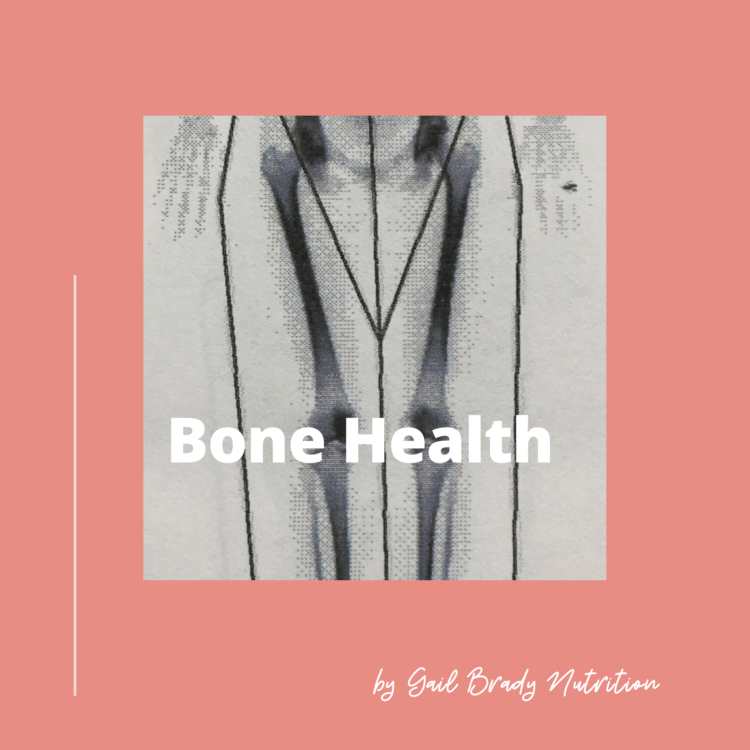The increased importance of protecting your bones in your forties and fifties (and beyond)
Your bones are continually being renewed, broken down and rebuilt.
By the time your reach your late twenties it is likely that you will have reached your maximum bone strength and density.
After this, bone breakdown and loss of bone mass increases with age for both men and women.
BUT for women, bone loss is rapidly accelerated following menopause, and for some women can lead to a degenerative condition called osteoporosis.
The time leading up to menopause (peri-menopause) which many women experience in their forties and fifties, can be a critical window for protecting your bones.
What is Osteoporosis?
Osteoporosis is a condition where your bones become porous and sponge-like, making them weak and prone to damage.
Women are 4 times more at risk of developing osteoporosis than men.
One of the main reasons for this is due to declining levels of the hormone oestrogen in perimenopause.
Oestrogen promotes bone formation. When it starts to decline around your late thirties or early forties, your bone health can be affected.
Post-menopause, bone loss can be as high as 2 -3 per cent a year.
The trouble is osteoporosis is silent.
You may not know that you have this disease until you break or fracture a bone. But by then a lot of damage has already been done…
The stage leading up to osteoporosis is called osteopenia when bond density has already started to decline.
Warning signs to look out for include a change in height of more than an inch, changes in posture and back pain. You could be more at risk if you have a family member with the condition.
A DEXA scan can provide information on your levels of bone mass and can identify osteoporosis or osteopenia.
If you are concerned about Osteoporosis, please visit the NHS website for further information and advice or speak with your GP or healthcare provider.
Risk Factors
There are many risk factors including a genetic predisposition, long term use of certain medications (glucocorticoids) and protein pump inhibitors used to lower stomach acid, early menopause and menopause, eating disorders, a low body weight, rheumatoid arthritis, digestive disorders and gut conditions that could inhibit the absorption of nutrients essential for bone health such as celiac disease, Crohn’s disease and ulcerative colitis.
Food allergies and sensitivities, elevated levels of thyroid hormone, chronic inflammation and lead toxicity can also be implicated.
Other factors that could contribute to an increased risk of osteoporosis include:
- Smoking
- Too much sitting and not enough exercise
- Not eating enough protein or healthy fats
- A vitamin D deficiency
- Mineral deficiencies including calcium and vitamin K
- Compromised gut health
- Certain foods and drinks such as carbonated drinks and excessive alcohol intake
- Chronic stress
- Poor sleep
How to protect your bones
Many nutrients are essential to bone health including calcium, vitamin K, vitamin C, magnesium, potassium, copper, zinc, boron and selenium.
The best way to ensure that you are getting all of these is by eating a healthy and varied diet with adequate levels of protein.
Vitamin D is also essential as it can help you to absorb calcium from your food.
But you also need to make sure that you are absorbing these essential nutrients.
There is a misconception that you need to eat lots of dairy foods to get calcium but you can get adequate calcium from other foods too.
Try including some of these foods in your diet – oily fish, especially sardines with bones, eggs, mushrooms, sesame seeds (tahini), dark leafy greens, kimchi, almonds, poppy seeds, spinach, and fortified plant milk (make sure you shake it up as the added calcium can sink to the bottom).
Including some healthy fats with each meal such as avocados, nuts and seeds, olive oil, eggs and oily fish can help to absorb some of these nutrients.
Protein helps to build bone mass. A palm-size serving for each meal is a good target to aim for. Good sources are poultry, fish, eggs, lentils, beans and pulses.
Grass-fed butter and dark green leafy greens are also good sources of vitamin K2 which is needed for bone health.
Supporting your gut health and identifying and eliminating food allergies and sensitivities could also be helpful.
Lifestyle Factors to support bone health
- Getting enough good quality sleep
- Managing stress
- It may be appropriate to supplement with a formula containing all the essential nutrients needed for bone health. Please consult your healthcare provider.
- A good quality multi-vitamin and mineral complex may also be appropriate
- Weight-bearing and resistance training/muscle strengthening exercise is vital to support bone health
At Gail Brady Nutrition, we focus on these four key areas of bone health
- Identify why you may be losing bone
- Address potential nutrient deficiencies
- Manage the absorption of these nutrients
- Support the building of bone mass
If you would like to support your bone health or have been diagnosed with osteopenia or osteoporosis contact gail@gailbradynutrition.com
Gail Brady is a registered nutritionist and women’s health expert. She helps women over 40 who are struggling with their health and hormones to feel the best version of themselves.
